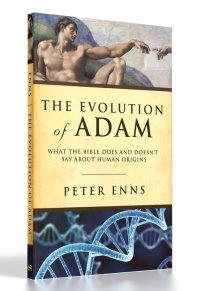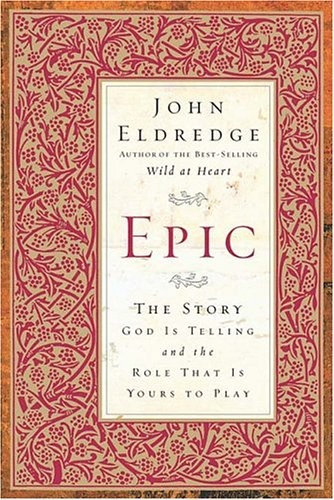The Evolution of Adam
 It’s hard to know where to begin writing about the experience of reading The Evolution of Adam: What the Bible Does and Doesn’t Say About Human Origins. It isn’t a book about evolution, which the author accepts as a true account of human origins. It’s a book about the Bible, one that challenges us to think about how our view of Adam needs to evolve in the face of the archaeological and scientific discoveries since the 19th century. I found it to be a fascinating, informative, sometimes destabilizing, ultimately exhilarating read.
It’s hard to know where to begin writing about the experience of reading The Evolution of Adam: What the Bible Does and Doesn’t Say About Human Origins. It isn’t a book about evolution, which the author accepts as a true account of human origins. It’s a book about the Bible, one that challenges us to think about how our view of Adam needs to evolve in the face of the archaeological and scientific discoveries since the 19th century. I found it to be a fascinating, informative, sometimes destabilizing, ultimately exhilarating read.
Biblical scholar Peter Enns has packed a lot into this fairly slim volume. The first half of the book focuses on Genesis (with discussion of the Old Testament in general) within its cultural context. Enns argues that Genesis shares many similarities with the stories of origins by other (older) ancient Near Eastern cultures. He proposes that the Old Testament was assembled after Israel’s exile to Babylon, including the Pentateuch (which we might have been taught was written by Moses close to the events it recounts). The overarching purpose of the Old Testament writers, Enns suggests, is self-definition. They were engaging questions like, “Who are we? Do we still have a special relationship with God even after all that’s happened to us?”
The second half of the book focuses on the apostle Paul’s teaching about Adam, and the way he used Old Testament writings (especially the Adam story) creatively to make his case for Christ. I learned so much about the biblical scholarship of Paul’s time, and it became apparent to me that the way Adam is understood has already undergone significant evolution. Enns makes the case that a historical Adam is not essential to acceptance of Paul’s teaching about Christ as God’s solution to the problems of sin and death.
Enns’ purpose in writing is essentially pastoral; he wants to show that a strictly literal reading of the Bible does both the Bible, and those who grant it authority, a disservice. The Bible can stand on its own in the face of changing scientific knowledge and historical investigation, but only if we ask of it what it legitimately supplies. He’s offering a tremendous storehouse of knowledge here for the purpose of a “theological reorientation” that will enable today’s Christians to engage both the Bible and the preoccupations of our own cultural milieu with confidence and integrity.
Speaking of doing a book a disservice, my summary in no way does justice to all that this book contains. I’m less interested in summary here than in processing some reactions to the book and perhaps through that giving you a sense of how much it has to offer, even if you don’t agree on every point. So here are the reactions that rise to the surface as I think back over my reading:
*Enns’ explanations of Scripture deal with aspects that I’ve noticed before and haven’t known what to do with. It was more satisfying than I can describe to find these bewildering passages and details addressed directly and set into a coherent picture.
*I was brought to a fresh appreciation for the riches of the Bible and the grace of God. I read one book review of this work that began by accusing Enns of being a heretic, but such a statement is utterly unfounded. Throughout the book it’s clear that he believes the Bible to be God’s inspired and authoritative Word, though not necessarily inerrant in its documentation of historical events or untainted by culture. “By faith I believe that the Christian story has deep access to a reality that materialism cannot provide and cannot be expected to know,” Enns writes in one of many affirmations of faith. His treatment of the Bible is honest and focused on accounting for, rather than ignoring or explaining away, scientific and archaeological data that doesn’t fall into line with biblical accounts. Isn’t this what we need?
*It was refreshing to take a step back and look at the Bible in its cultural contexts — the thought worlds and literary traditions of its human writers. This challenged me to think about what I really believe about the Bible, and it underscored how humble God is willing to be (he allows himself to be described in the terms we humans can come up with), and just how amazing inspiration is. I can’t resist quoting from the book here:
A noncontextual reading of Scripture is not only methodologically arbitrary but also theologically problematic. It fails to grasp in its entirety a foundational principle of theology that informs not only our understanding of the Bible but of all of God’s dealing with humanity recorded there, particularly in Jesus himself: God condescends to where people are, speaks their language, and employs their ways of thinking. Without God’s condescension — seen most clearly in the incarnation — any true knowledge of God would cease to exist.
It is not beneath God to condescend to culturally conditioned human modes of communication. Having such a condescending God is crucial to the very heart of Christianity. True, such a God will allow ancient Israelites to produce a description of human origins that reflects the ancient ideas and so will not satisfy scientific questions. But if we are going to talk about the Christian God, then this is something we are going to have to get used to. What sets this God apart is his habit of coming down to our level. Posing such a condescending and incarnating God as a theological problem to be overcome — which is what a literal reading of Genesis unwittingly requires — creates a far greater and more harmful theological problem than the nonliteral reading of Genesis.
I was reminded of C.S. Lewis’s remarks in Reflections on the Psalms:
[T]he value of the Old Testament may be dependent on what seems its imperfection. It may repel one use in order that we may be forced to use it in another way… to feel the very contentions between the Word and the human material through which it works… Certainly it seems to me that from having had to reach what is really the Voice of God in the cursing Psalms through all the horrible distortions of the human medium, I have gained something I might not have gained from a flawless, ethical exposition. The shadows have indicated (at least to my heart) something more about the light.
There is no sense of denigrating the “human medium” in The Evolution of Adam, but like Lewis does here I marveled at the way God uses such limited vessels to convey himself, and manages to highlight his own grace and grandeur even more in the process.
*It was wonderful to read of a different interpretation of the fall of man than the “original sin” explanation I’ve heard. Rather than seeing the act of disobedience as a prideful grasping to be like God, with God subsequently inflicting the punishment of inborn sin and death on all humanity to follow, an alternative reading sees it as a wisdom story: Adam and Eve were innocent and naive, and the serpent (who was more subtle than anyone else in the Garden) tricked them. Their act of disobedience was important not because God didn’t want them to know about good and evil, but because they stepped out of his plan in order to learn about it. They introduced chaos into God’s created order. (Enns’ perspective on this concept of order in the Old Testament makes a lot of sense to me. It’s elucidated in Telling God’s Story too.)
Honestly, I think I’ve always seen this story more in this light, though I haven’t thought about it very much directly. It seems to account more fully for the details of the story. This was my experience many times in reading The Evolution of Adam: finding passages that I haven’t really understood set before me and clarified, finding that my own intuitions have a home in a larger tradition I didn’t know about, finding a beautiful order and coherence among aspects of Scripture and doctrine.
There is so much more I would have to write if I were going to be complete in recounting the impact of this book, but this post is already long enough that no one is probably still reading it. But here is one final thought: in a Victorian literature class in graduate school, I remember the professor explaining to us that there were three major developments in the 19th century that shook people’s faith:
- Darwin’s Origin of Species
- Freud and the discovery of the unconscious
- Higher biblical criticism (studying the Bible in its cultural and literary contexts)
It’s interesting to me that The Evolution of Adam takes up two of these three developments in the 21st century because they still represent challenges to many people of faith. It seems to me that the evangelical tradition has not responded that well. The problem isn’t God, but it may well be the lens we’re using to view him and his Word. The Evolution of Adam suggests some adjustments to this lens — “recalibrations,” “reorientations” — that in no way undermine Scripture, but do bring greater light and clarity to the conflicts regarding origins, science and history, literalism and its alternatives.
This book is my first experience with historical criticism, and I found it to be rejuvenating to my faith and stimulating to my mind. It makes me want to return with fresh energy to the pages of my Bible, and to learn more about its surrounding contexts. I recommend it highly.



10 Comments
Pingback:
Amy
I feel too ignorant about this to say anything more than thanks for sharing.
Dennis King
Hi, Janet. Thank you for this review. It has certainly whetted my appetite. I’ll look forward to ordering and reading this book.
Recently I was reading an article describing the key differences between Muslim and Christian understandings of God. One of those differences is in our understanding of God’s Holy Book. Muslims believe that the Koran came to them directly from God without human involvement. They believe that the Bible is unreliable because God worked through human beings to produce it. I think that is a very profound difference in the understanding of divine inspiration and how God chooses to work through us rather than despite of us.
Dennis King
in spite of us.
Janet
That’s so true. At one point while I was reading this, it crossed my mind that it would be “easier” in some ways (though harder in others) to have a scroll handed down directly from Heaven, like some of the other religions and cults claim to have. But such a thought only serves to highlight the uniqueness of the Christian Bible, and what is suggested and accomplished by the process of divine inspiration. It conveys some important insight about God, and also about his view of humanity.
I would love to hear your thoughts on this after you’ve read it! Thanks for stopping by.
SethH
Great review! I’ve had this book on my list for quite a while, having read other BioLogos authors. I came, several years ago, to accept evolution but am still trying to work out how it fits in with Adam and theology. So this will definitely be a book I’ll need to read.
Janet
Sounds like we’re on a similar path. I read The Language of God a few years ago and it helped me to process the issue, but like you I was looking for more on the theological aspects of it. This book is a rich resource — maybe I’ll get to see your review after you’ve read it.
SethH
I’ve also read The Language of God and the more recent The Language of Science and Faith. Great stuff. And I’ll definitely review it if I ever get around to it…;)
Wonders for Oyarsa
Hi Janet,
Good stuff there. If you’re interested in more historical criticism in a way that is helpful to reading scripture, I recommend N.T. Wright’s writings. Very helpful and edifying stuff.
Janet
Good to hear from you, Wonders for Oyarsa! Thank you for the recommendation.